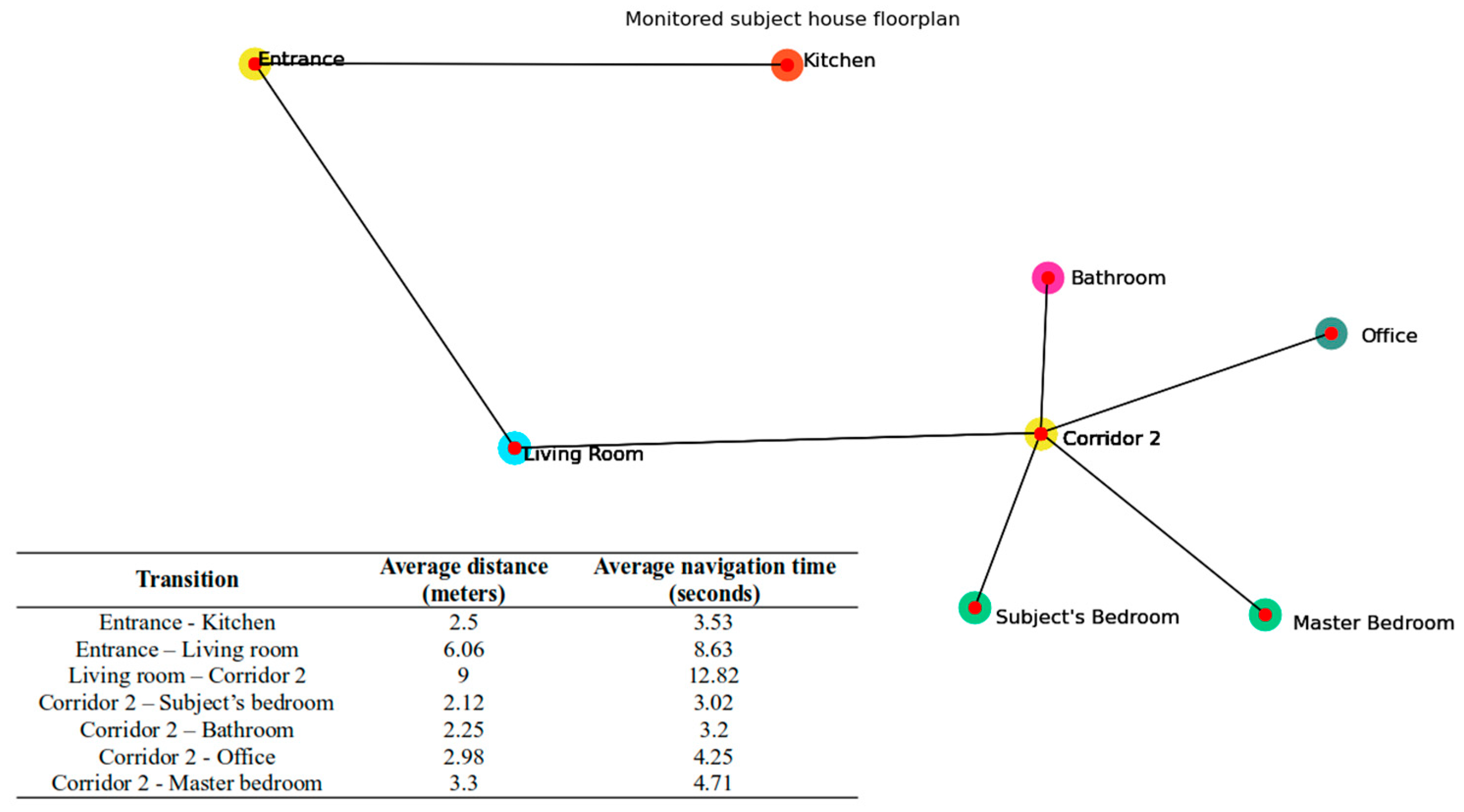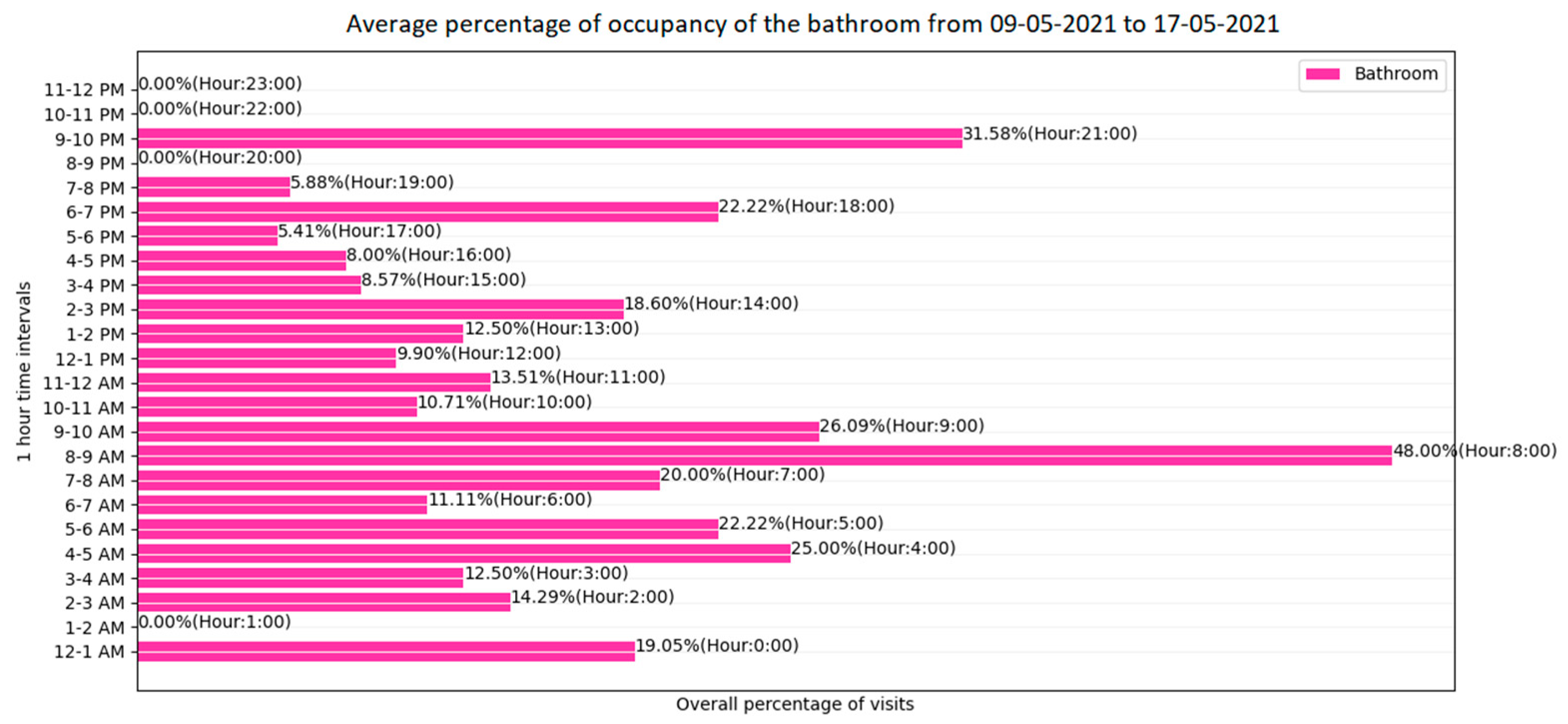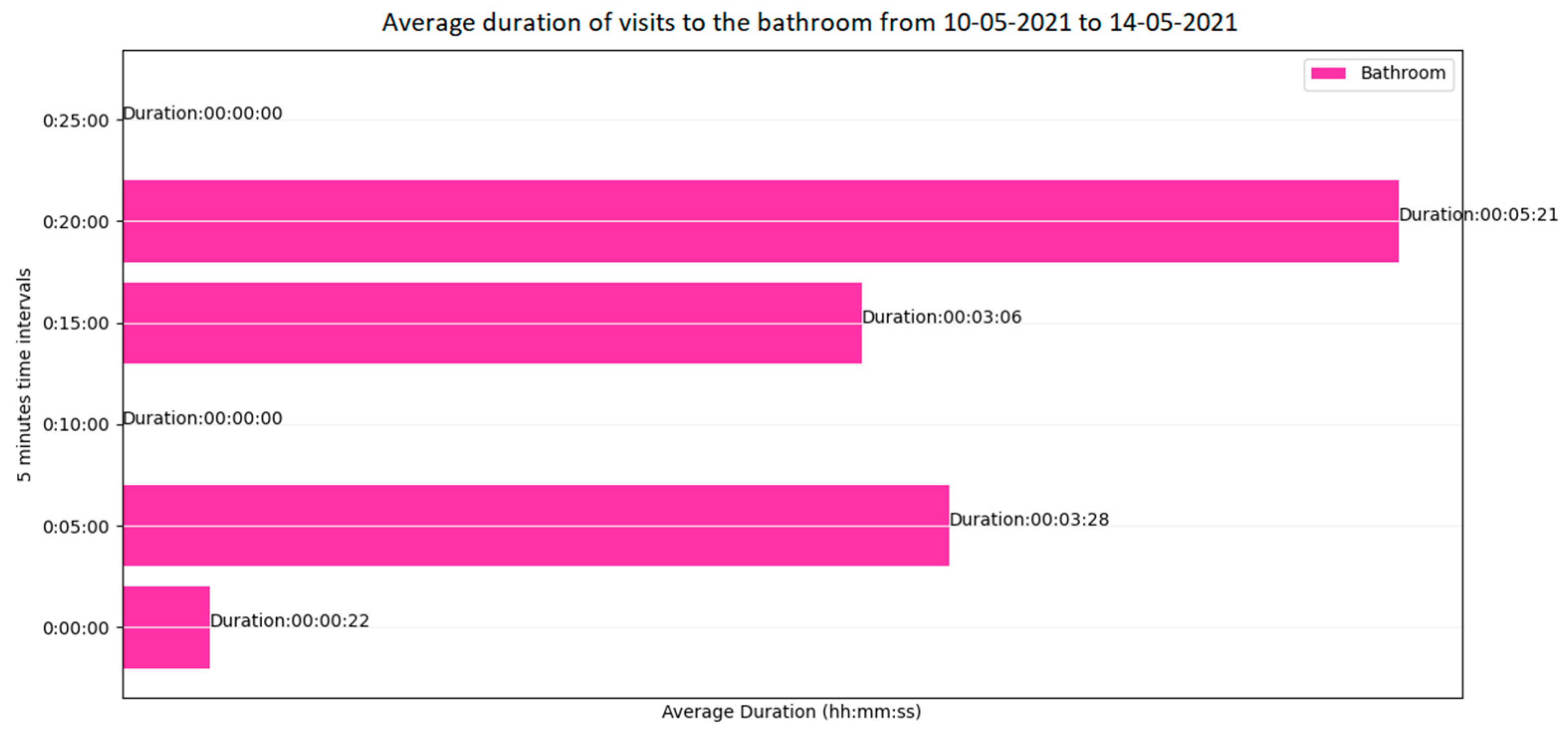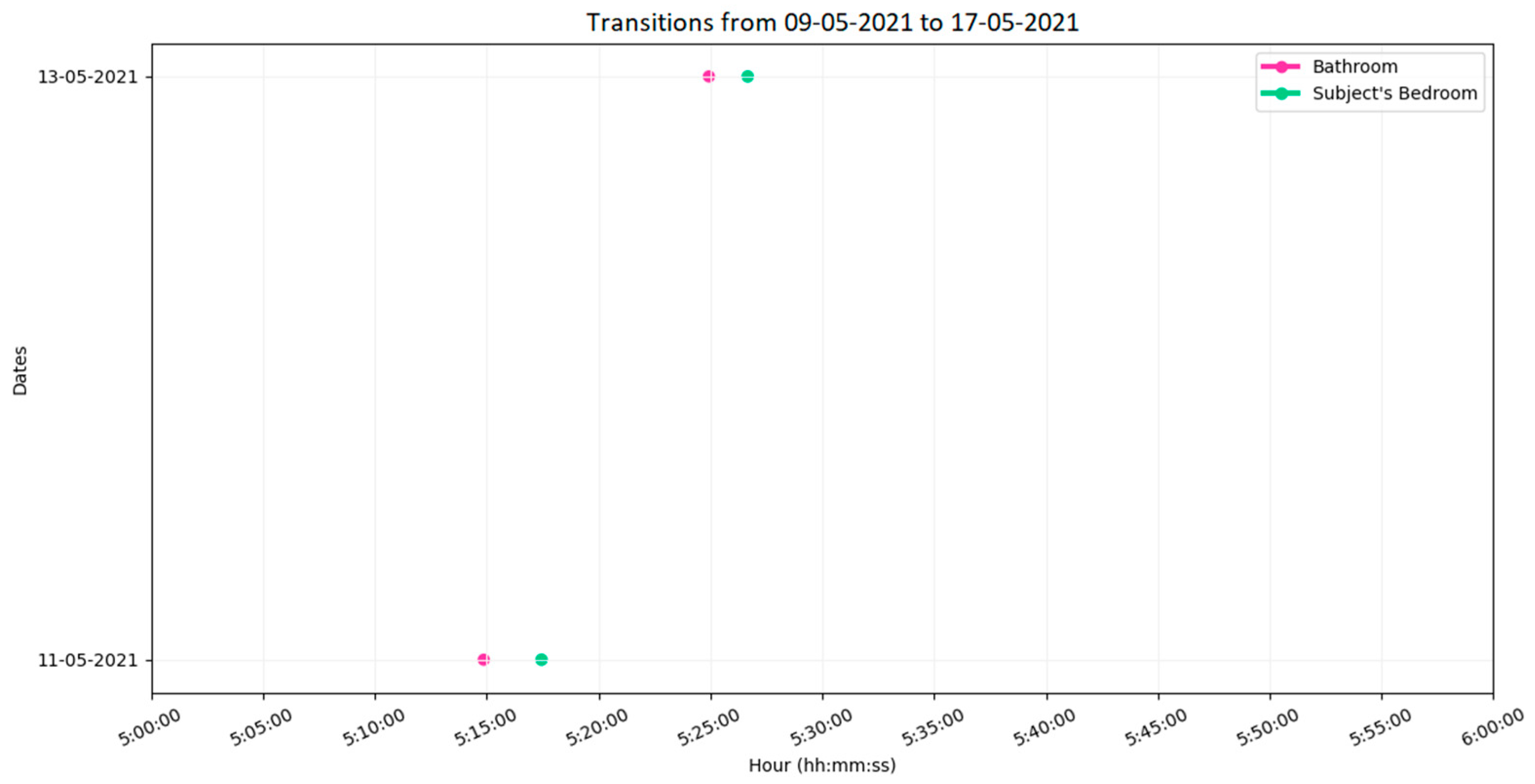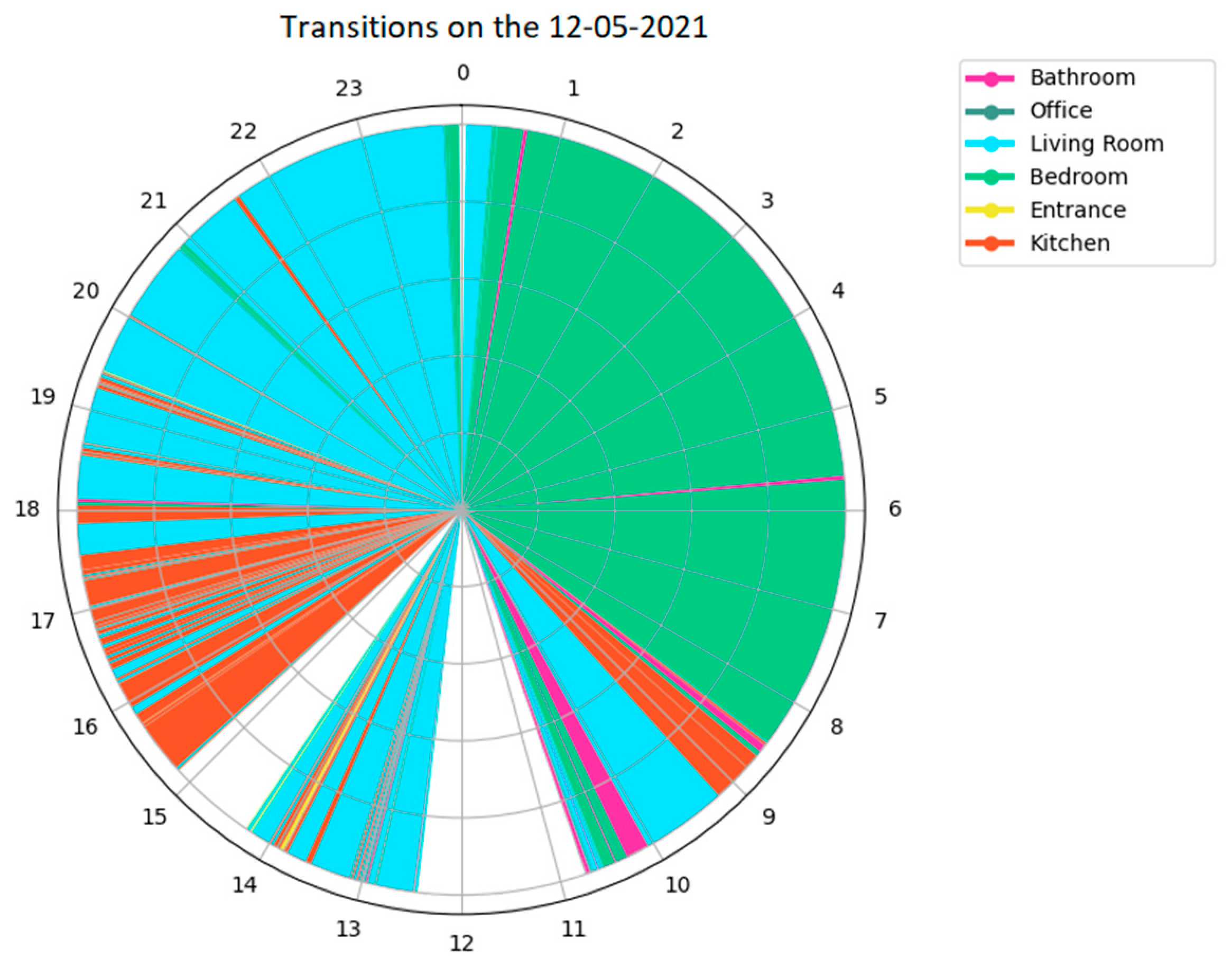1. Introduction
Existing literature has shown that professionals from a range of disciplines related to built environments, health and social care, and family members of vulnerable older people, could potentially decipher benefit from information showing how householders move around domestic spaces .
Iweka et al. showed how information about people’s behaviour in relation to the use of space is needed to ensure an effective transition towards optimal energy use in private dwellings [
1]. Tabaeian pointed out that, “since the human behaviour is performed in defined spaces, it is necessary to design the physical space based on people’s behavioural characteristics” [
2]. Therefore, people’s behaviour information contributes to a more optimised design process. Furthermore, Ayalp highlighted the intrinsic relationship between the built environment and its inhabitants [
3]. Ayalp pointed out the importance and the need to use information representative of domestic human’s behaviour when designing new homes. In addition, in this line, Mahmoud noted how interior architectural characteristics of the space impact the accessibility and circulation of people [
7]. In this case, information about human behaviour can be used to improve the physical characteristics of a house, ultimately benefiting people's accessibility and mobility. Overall, information on human behaviour in living spaces is of great value in the architectural design process of a house and its interior characteristics, which will ultimately have an
impact on people's well-being [
8].
Researchers have shown how useful this information can be for health and social care professionals, but also for family members of older people living independently. Bouchachia and Mohsen, who designed a smart home approach to support caregivers working with people with dementia remarked that family members can use smart home information to keep track on the daily basis of their loved one’s daily routines, while occupational health professionals could use this information to improve their knowledge of patients [
4]. Fritz et al. conducted a study to familiarise nurses with smart home technology in order to enable automated remote monitoring and assessing of patient’s heath [
5]. Their findings suggest that care insights from smart home sensor data can be used by nurses to initiate preventive strategies and timely interventions. This leads to safer, more independent living for older adults. Zhu et al. developed a density map visualisation for elderly care [
6]. Their approach was adopted by health professionals at TigerPlace, a senior living community. This work demonstrated the effectiveness of using data visualisations to display motion sensor data in order to help nurses provide better care to their patients.
This paper presents a systematic approach, based on the Knowledge Discovery in Databases process (KDD) process, which uses sensor data that reflect the transitioning between locations in a home (e.g., moving from the bedroom to the bathroom) and provides time-based information about the use of different rooms in the home (e.g., at 2 a.m., moved from the bedroom to the kitchen and stayed for 5 minutes) by a monitored resident. The data is then transposed to a set of data visualisations to provide supporting evidence on the following aspects of the monitored household's daily routines:
What is the frequency of the visits to the locations?
What are the most common transitions between locations?
Which hours of the day are most representative of an activity taking place in a particular location?
How long on average does the monitored subject spend in a location?
This information is not fully representative of activities such as “brushing teeth” or “preparing food”, but is intended to be useful to carers or observers who need to understand the spatial and temporal aspects of other person's routines in their home. It also can let designers know space usage and areas that have the highest transition, for example, kitchen to dining room, so more care can be taken during the design of these spaces.
With this in mind,
Section 2 provides an overview of the proposed overall methodological KDD process.
Section 3 describes the evaluation study conducted to gather feedback and first impressions from the main consumers of the information provided by the KDD process. The responses collected through the evaluation study are analysed in
Section 4. Finally,
Section 5 presents the conclusions based on the results of the thematic analysis carried out.
2. Proposed Method
The mapping of low-level sensor data into other forms, which may be more compact, more abstract, or more useful, involves various steps that go beyond the computational reasoning of the datasets. There are several questions that need to be addressed as a part of this process, including what types of data are needed, how the data will be stored, how the data will be processed, and how the results will be presented. In 1996, Fayyad et al. described the term knowledge discovery in databases process as the “non-trivial process of identifying novel, potentially useful, and ultimately understandable patterns or relationships within a dataset in order to make important decisions.” [
9].
So, KDD is a systematic and iterative way of uncovering structures of information, understandable patterns, from data that can be interpreted as valid. In addition, these entities should be valid for new data with some degree of certainty, resulting in some benefit to the end user or task [
10].
As a result of this successful methodology proposed by Fayyad et al., different KDD approaches were derived mainly for business [
10]. The five steps (Sample, Explore, Modify, Model and Assess), (SEMMA), is the data mining process developed by the SAS Institute for enterprises to solve different business problems [
11]. In this line, business oriented, the Two Crows Consulting also proposed a data mining process model very similar to the original KDD process [
12]. Anand and Buchner proposed an internet-enabled knowledge discovery process model adapted to web mining project [
13]. Similarly, in 1997, Cabena et al. suggested a business oriented KDD process which included most of the steps involved in the original KDD process [
14]. Brachman and Anand introduced a different perspective, a human-centered process, focusing on the data analyst as the key actor in the overall KDD process [
15]. One of the main reasons for this argument is that the extraction of valuable knowledge requires prior background knowledge beyond the data and its analysis, and this background knowledge of the study area, according to the authors, resides only in the analyst.
Although the number of steps on the KDD approach studied can vary, the generic steps involved are:
Developing an understanding of the end goal.
Data collection.
Data cleaning and preprocessing.
Data transformation.
Data mining.
Output evaluation/interpretation.
Knowledge discovery and use.
Our KDD approach follows the idea put forward by Brachman and Anand, we propose a human-centred approach to allow the analyst's background knowledge to participate in the knowledge discovery process. The KDD process evaluated in this paper emulates the steps of the scientific method. Thus, the process starts with a question formulated by the analyst, e.g., What is the resident's night-time routine? This leads to the formulation of a hypothesis, via deduction, perhaps that the night-time routine of the resident includes the use of the bathroom and the bedroom, that a minimum duration is expected for these events, and that the frequency of visits to the bathroom should not exceed 2 minutes on average. To test the hypothesis derived from the analyst's background knowledge, four data visualisations were adapted. The parameters used to display the information can be modified by the analyst. So, iteratively examining these data visualisations, a conclusion can be drawn. The steps given in this example can be compared to the KDD steps previously mentioned:
The question addressed (1. Developing an understanding of the end goal).
Developing a hypothesis (1. Developing an understanding of the end goal).
Testing the hypothesis (5. Data mining).
Making observations (6. Output evaluation/interpretation).
Examining results and drawing conclusions (7. Knowledge discovery and use).
Through each iteration of the KDD process is intended to bring the analyst closer to a more complete view and in-depth understanding of the domestic routine being analysed. The key spatial and temporal parameters used to analyse the daily routine include:
Order in which locations are visited.
Times of the day when visits to locations are most likely to occur.
Average duration of the visits depending on the time of arrival to the location.
Days of the year when previous observations occurred.
This information can then be used, for example, by architects to understand how people use spaces. Or by healthcare professionals and family members to better understand the behavioural aspects of a monitored loved one.
The survey carried out, the results of which are discussed in this paper, has evaluated the data visualisations adopted and adapted to enable the analysis of the data. The rest of the steps including, data collection, techniques for data cleaning and preprocessing, and data transformation are out of the scope of this paper.
3. Evaluation
The workshops developed aimed to engage the study participant with a prototype of the step-by-step data analysis process in order to engage with the volunteer participant about the extent to which low-level sensor-based data could be a meaningful source of information.
The evaluation study was conducted using Google Forms and involved architects, engineers and end-users (not the occupant, but the care team managing the occupant). The evaluation consisted of the following sections.
Section A: Understanding the data and metadata.
In the first part, the participant was given a brief introduction to the research and what was expected of them in this study. In addition, they were shown a representation of the layout of the house where the monitored subject lived. This Tube-map visualisation of the house is designed to make it easier to understand the possible transitions between rooms, e.g., adjacent rooms. To this end, the rooms are represented by circles of different colours, i.e., every bathroom is coloured pink and every bedroom green, and the possibility to move between two locations (we call this a transition) is represented by a straight line (we call this an edge), as shown in
Figure 1. In addition, the average distance in metres between two rooms is also shown, calculated as the distance from the centre point of one room to the transitioning area, i.e., door, open wall, lift, or staircase. And from this point to the centre of the adjacent room. Finally, the average time it would take to cover this distance to a 70 to 80 year old person is also indicated. It was explained to the participants that this information is obtained from the expanded Building Information Model (BIM) based on the original BIMXML model, which is a key enabler for the reusability of the process regardless of the architectural characteristics of the house.
Based on this information, the participant was asked to rate, on a scale from 0-Very difficult to 4-Very easy, how s/he found to understand the possible movements that can be made by a resident based on the floor plan of the house.
Section B: Adding context to the dataset and establishing a daily routine hypothesis.
This section provided with a brief explanation of the context in which the dataset analysed was created, i.e., the age of the monitored resident, whether s/he lived independently or with other family members, and the time period over which the data was collected. Then, the volunteer participant was asked the following question; based on your own background knowledge, could you describe how you imagine the sleeping night routine of the resident being monitored? For example, what locations of the house do you think are occupied/visited? And if there is any timing associated such as, time of arrival to a specific location, or minimum time spent in it. The answers provided by the analyst (volunteer participant in this study) would be used as the hypothesis to be verified or refined during the visual data exploration. Ultimately, this will help the analyst to gain a deeper understanding of the resident's behaviour derived from domestic routines.
Section C: Understanding the data visualisations.
This section introduced the participant of the study to the data visualisations selected and adapted to enable the analysis of the data. The data visualisations used in this work have been chosen to “tell a story” by displaying key spatial and temporal aspects previously discussed.
a) Visualisation 1: This diagram shows a summary of the average percentage of sensor events (monitored resident visits) per time interval of 1 hour in a selected location from the dataset. Overall, this visualisation aims to provide an insight into the times of day when the monitored subject is most likely to visit the location selected for the analysis, for example the bedroom in
Figure 2.
b) Visualisation 2: This diagram shows a summary of the average duration of the sensor events (monitored resident visits) in a selected location, e.g., the bathroom, in time intervals of 5 minutes for a selected window of time, e.g., from 00:00:00 to 00:30:00,
Figure 3.
It was aimed to use this information in combination with the previous shown in the visualisation 1. Hence, allowing to know how often on average the monitored resident visits the selected location, and how long s/he spends there on average.
c) Visualisation 3: This diagram shows the sequence, or order, of the locations through which the monitored resident passed between different days. In order to simplify the content of this diagram, no time information relating to the duration of the events is shown. The time window over which the sequences are drawn can be manually selected by specifying the start and end times of the sequences, e.g., from 00:00:00 to 00:20:00,
Figure 4.
d) Visualisation 4: The aim of this diagram is to show additional temporal information to the sequences previously shown for a selected day. Therefore, adding a layer of temporal context which can be used to estimate the start time, duration, and end time of every visit on a selected day,
Figure 5.
After completing the description of these visualisations, participants were asked the following questions to assess the effectiveness of the process and the data visualisations evaluated:
Would you have been able to identify the identity of the monitored resident or other people from the dataset used?
Were the data visualisations useful to accept or refine your preliminary hypothesis?
Could you please explain why the information provided through this process is important and could be useful to you, based on your personal or professional experience?
To conclude, volunteers were given the possibility to submit further comments or suggestions.
Their answers and feedback are discussed in the following section.
4. Results and Discussion
The evaluation study was conducted by 17 multidisciplinary participants including architects, engineers and end-users. They were selected based on their professional’s backgrounds. The qualitative data collected was analysed based on the thematic analysis approach developed by Braun and Clarke [
16]. In this line, the process involved the following steps:
Familiarisation with the data.
Creating initial codes.
Collating codes with supporting data.
Grouping codes into themes.
Reviewing themes.
Writing the narrative as follows.
Through these steps is intended to characterise and identify repeated patterns or themes from the data collected. As a result, we found 6 dominant themes in the data which support the decisions made during the design of the process. These themes are:
Human behaviour concerns.
Temporal awareness related to resident’s domestic routines.
Spatial awareness related to resident’s domestic routines.
Architectural applications.
Healthcare applications.
Improvement suggestions.
As described in the first section of the paper, the value and importance of understanding people's behaviour in the home is supported by a wide range of authors. The first theme, human behaviours concerns, could be said to focus on the how things are done at home. For example, different responses said:
“With the information derived from the graphs and diagrams we can get a real idea of the routine of any person.”
“These routines help us to identify different behaviours and study each case individually.”
“In the case of visualisation 4, at a glance you understand the daily routine of the subject. Simple and very informative. I find this one very useful.”
But also to shed light on health disorders that may appear during a person's life:
“This process could be useful to better understand the night routines of a friend who had sleepwalking episodes.”
More obvious is the fact that older adults living independently need special attention. Knowing how a loved one's week has been means peace of mind when they live independently. We could see this, for example, in the answers of the volunteers:
“I find this research incredibly useful especially for those who live alone and still need some kind of assistance.”
“I immediately thought about elder people and how their life and safety may be improved via this monitoring process.”
“Simple and very informative. I find this approach very useful. Mainly for monitoring elderly and dependent people. For example, an increase in visits to the bathroom may indicate that the subject has a health problem.”
Once the importance of how we do things at home is highlighted, we need to find parameters that accurately reflect people's behaviour. So how requires knowing where and when. In order words, spatio and temporal information. Human behaviour resulting from activities of daily living can take many different forms. However, there are common things that we all expect to see. For example, different people may have different sleeping routines, but we can all agree that a person is expected to sleep in her or his bedroom for at least 7 to 8 hours a night. This was confirmed by the responses:
“Visualisation 4 is quicker to understand, and provides more information, where, when and for how long.”
“Repeated visits to the kitchen, short or not, may indicate an eating disorder (ED).”
“It is important to understand where most of our time is spent in our home to see maybe where we are most productive, where we “waste” a lot of our time, how we can improve/maximize our spatial use and temporal dimensions within the home.”
From the literature, we were aware of the value of this information to two main groups of stakeholders, building professionals and health professionals. For the former, the use of the space could be an advantage in terms of optimising future designs and the impact they could have on householders. The latter might be able to benefit from this information, for example, to support what has been said by a patient in a traditional assessment. In order to verify these assumptions, we invited different members of each group among the participants. Their feedback supports the previous statements. For example, a researcher on energy efficient buildings said:
“One of the biggest uncertainties that any control strategy get effected by is the occupancy behaviour and movement. For example, the adaptive thermally insulated blind was found to be ineffective if the human behaviour not talking into account in the control strategy. This research is beneficial when it comes to controlling building systems and in other building systems such as the lighting system and heating system.”
Also, another architectural researcher pointed out the following:
“As an architect I think it is very important to understand the users requirements. This information will be really useful in tailored space design, especially for people with special needs.”
Healthcare professionals also noted the value of this information in their daily work. An experienced worker with people with disabilities said:
“As a professional in the health care area with experience with people with disabilities, it brings new possibilities for me when it comes to studying behaviours of people with some intellectual and/or physical disability, since most of the time we cannot simply ask the subjects directly.”
A healthcare professional working with older adults pointed:
“I think it would be useful given that many older adults have falls at night and lay on the floor forlong periods until someone visits in the morning. If this data was available it could help trigger an alarm/alert a next of kin if a family member left a bedroom at night (for example to use the toilet) and did not return within 5 minutes, they may have fallen and this could help them be found faster and possibly prevent further damage and trauma and allow them to seek help quicker.”
A background psychologist commented on the importance of the use of this information as evidence in the assessment of patients.
“It could also help to understand moods by analysing where and when patients feel happy/sad/anxious and see if changing the spatial/temporal dimensions in the house could affect their mood. This could then be applied for other settings such as offices or even coffee shops to maximize employee well-being and productivity based on spaces, time spent in those spaces and time to move between those spaces.”
An occupational therapist noted that:
“It seems to me a necessity tool, since relying on human attention to detect unusual patterns of behaviour would, in my opinion, lead to errors.”
Despite the positive feedback, it is also important to highlight the limitations that some volunteers found when carrying out the evaluation. The diagrams were designed to tell a story in a language that people could understand. However, some responses suggested that certain aspects could be improved to make them more accessible and effective. For example, visualisation 3 described in the previous section shows the order in which places are visited, and it was designed to minimise the complexity of the information by removing the duration of the events. However, this visualisation encountered more difficulties in getting the message across:
“The graph illustrating the transitions might be improved by using a continuous line between dots to show previous locations not present in the current form. For example, if you view from midnight to 3am, and the person was in the bedroom prior to midnight, this would not be obvious from the transition dot showing the new location.”
“Visualisation 3 I think provides less data to an end user without previous knowledge, because seeing only points in a graph is not understandable for everyone, especially when there is more data and the graph is complicated with many more points.”
“I found some of the graphs difficult to interpret and had to look at them a number of times.”
In addition, the evaluation of the simplified tube-map of the house layout described in Figure 1 showed a high level of acceptance among the study participants. From the 16 responses, 11 rated with a score of “4-Very easy” how they found to understand the possible movements that can be made by the monitored resident through the premises. The other 5 participants rated with a score of “3-Easy” the visualisation. These results suggest that a simplified representation of the layout of a house can improve the interpretation and understanding of the physical space in which the monitored resident lives. It is important to emphasise that this graph was developed to this purpose and to avoid unnecessary complexity in traditional house floor plans for non-technical people.
5. Conclusions
In this paper, we evaluated the KDD process to promote awareness about spatial, temporal and transitions between locations aspects resulting from monitoring domestic routines. The feedback collected from stakeholders in the construction industry suggests that this information can be of great interest, for example, in the development of energy-efficient building solutions, and to architects to consider the post-occupancy of the building during the design phase. In addition, potential end-users such as family members of vulnerable population living independently, including the elderly and people with physical and mental disabilities, commented on the value of increased awareness on temporal and locations transited information to better understand how their loved one is doing on a daily basis. The feedback obtained also showed the positive usability of the Tube-map, which was created to help people understand the topology of the building.
Finally, future work will focus on further evaluation to gain a deeper understanding of the value of knowing how people conduct their daily routines at home.
Author Contributions
For research articles with several authors, a short paragraph specifying their individual contributions must be provided. The following statements should be used “Conceptualization, X.X. and Y.Y.; methodology, X.X.; software, X.X.; validation, X.X., Y.Y. and Z.Z.; formal analysis, X.X.; investigation, X.X.; resources, X.X.; data curation, X.X.; writing—original draft preparation, X.X.; writing—review and editing, X.X.; visualization, X.X.; supervision, X.X.; project administration, X.X.; funding acquisition, Y.Y. All authors have read and agreed to the published version of the manuscript.” Please turn to the CRediT taxonomy for the term explanation. Authorship must be limited to those who have contributed substantially to the work reported.
Funding
This research received no external funding.
Institutional Review Board Statement
Not applicable.
Informed Consent Statement
Informed consent was obtained from all subjects involved in the study.
Data Availability Statement
We encourage all authors of articles published in MDPI journals to share their research data. In this section, please provide details regarding where data supporting reported results can be found, including links to publicly archived datasets analyzed or generated during the study. Where no new data were created, or where data is unavailable due to privacy or ethical restrictions, a statement is still required. Suggested Data Availability Statements are available in section “MDPI Research Data Policies” at
https://www.mdpi.com/ethics.
Conflicts of Interest
The authors declare no conflict of interest.
References
- O. Iweka, S. Liu, A. Shukla, and D. Yan, ‘Energy and behaviour at home: A review of intervention methods and practices’, Energy Res. Soc. Sci., vol. 57, no. June, p. 101238, 2019. [CrossRef]
- S. M. Tabaeian and A. Einifar, ‘A Study of the Perspectives of Architecturale and Environmental Psychology (Theoreticians and Psychologists)’, Int. J. Archit. Urban Dev., 2011.
- N. U. R. Ayalp, ‘Cultural identity and place identity in house environment: Traditional Turkish house interiors’, TOBB ETU Univ., vol. 64, p. 69, 2012.
- M. Amiribesheli and H. Bouchachia, ‘A tailored smart home for dementia care’, J. Ambient Intell. Humaniz. Comput., vol. 9, no. 6, pp. 1755–1782, Nov. 2018. [CrossRef]
- R. Fritz, K. Wuestney, G. Dermody, and D. J. Cook, ‘Nurse-in-the-loop smart home detection of health events associated with diagnosed chronic conditions: A case-event series’, Int. J. Nurs. Stud. Adv., vol. 4, no. January, p. 100081, 2022. [CrossRef]
- S. Wang, M. Skubic, and Y. Zhu, ‘Activity density map visualization and dissimilarity comparison for eldercare monitoring’, IEEE Trans. Inf. Technol. Biomed., vol. 16, no. 4, pp. 607–614, 2012. [CrossRef]
- H.-T. H. Mahmoud, ‘Interior Architectural Elements that Affect Human Psychology and Behavior’, Acad. Res. Community Publ., vol. 1, no. 1, p. 10, 2017. [CrossRef]
- I. Butterworth, ‘The relationship between the built environment and wellbeing: a literature review’, Prep. Vic. Health Promot. Found., 2000.
- P. S. Usama Fayyad, Gregory Piatesky-Shapiro, ‘From Data Mining to Knowledge Discovery in Databases’, AAAI Press MIT Press, vol. 17, no. 3, pp. 1–34, 1996.
- G. Mariscal, Ó. Marbán, and C. Fernández, ‘A survey of data mining and knowledge discovery process models and methodologies’, Knowl. Eng. Rev., vol. 25, no. 2, pp. 137–166, 2010. [CrossRef]
- ‘Introduction to SEMMA’, documentation.sas.com, 2017. https://documentation.sas.com/doc/en/emref/14.3/n061bzurmej4j3n1jnj8bbjjm1a2.htm (accessed Jan. 01, 2023).
- Two Crows Corporation, Introduction to data mining and knowledge discovery, 3rd ed. Potomac, Maryland: Two Crows Corp., 1999.
- A. G. Buchner, M. Mulvenna, S. S. Anand, and J. Hughes, ‘An internet-enabled knowledge discovery process’, in 9th International Database Conference on Heterogeneous and Internet Databases, IDC, 1999.
- P. Cabena, P. Hadjinian, R. Stadler, J. Verhees, and A. Zanasi, Discovering data mining: from concept to implementation. Prentice-Hall, Inc., 1997.
- R. J. Brachman, ‘The Process of Knowledge Discovery in Databases : A First Sketch’, in Advanced in knowledge discovery and data mining, 1996, pp. 1–11.
- V. Braun and V. Clarke, ‘Using thematic analysis in psychology’, Qual. Res. Psychol., vol. 3, no. 2, pp. 77–101, Jan. 2006. [CrossRef]
|
Disclaimer/Publisher’s Note: The statements, opinions and data contained in all publications are solely those of the individual author(s) and contributor(s) and not of MDPI and/or the editor(s). MDPI and/or the editor(s) disclaim responsibility for any injury to people or property resulting from any ideas, methods, instructions or products referred to in the content. |
© 2023 by the authors. Licensee MDPI, Basel, Switzerland. This article is an open access article distributed under the terms and conditions of the Creative Commons Attribution (CC BY) license (http://creativecommons.org/licenses/by/4.0/).
